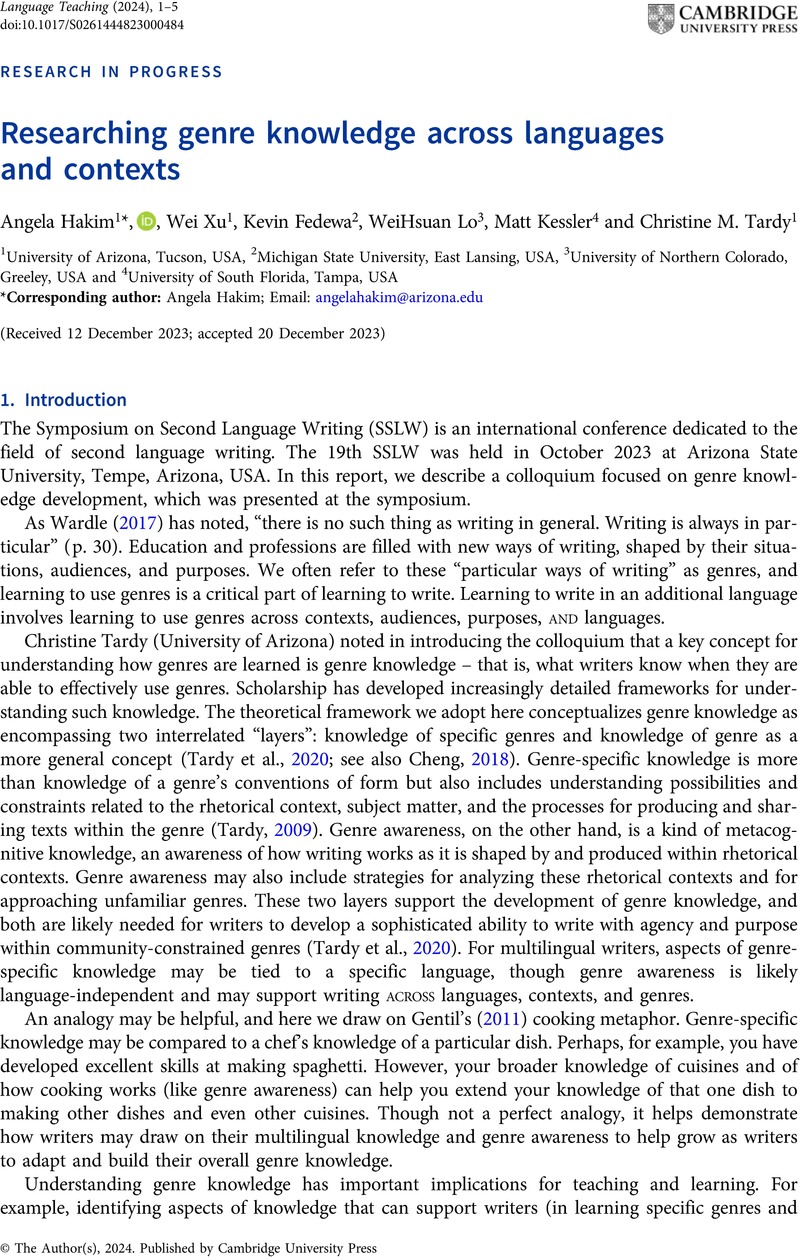No CrossRef data available.
Article contents
Researching genre knowledge across languages and contexts
Published online by Cambridge University Press: 05 February 2024
Abstract
An abstract is not available for this content so a preview has been provided. Please use the Get access link above for information on how to access this content.

- Type
- Research in Progress
- Information
- Copyright
- Copyright © The Author(s), 2024. Published by Cambridge University Press
References
Cheng, A. (2018). Genre and graduate-level research writing. University of Michigan Press.CrossRefGoogle Scholar
Eppler, M. J. (2006). A comparison between concept maps, mind maps, conceptual diagrams, and visual metaphors as complementary tools for knowledge construction and sharing. Information Visualization, 5(3), 202–210. doi: 10.1057/palgrave.ivs.9500131CrossRefGoogle Scholar
Gentil, G. (2011). A biliteracy agenda for genre research. Journal of Second Language Writing, 20(1), 6–23. doi:10.1016/j.jslw.2010.12.006CrossRefGoogle Scholar
Gentil, G. (2021). Multicompetence and L2 writing. In Manchón, R. M. & Polio, C. (Eds.), The Routledge handbook of second language acquisition and writing (1st ed., pp. 109–122). Routledge. doi:10.4324/9780429199691-14CrossRefGoogle Scholar
Kessler, M., & Tuckley, L. (2023). Mapping metacognitive genre awareness with L1 and L2 writers: Investigating novices’ engagement with an occluded genre. Journal of Second Language Writing, 62, 101042. doi:10.1016/j.jslw.2023.101042CrossRefGoogle Scholar
Pun, J., & Cheung, K. K. C. (2023). Developing and validating a genre awareness questionnaire for writing scientific reports. Frontiers in Psychology, 14, 1210240. doi:10.3389/fpsyg.2023.1210240CrossRefGoogle ScholarPubMed
Séror, J., & Gentil, G. (2023). Direct observation of writing activity: Screen capture technologies. In Manchon, R. & Roca de Larios, J. (Eds.), Innovative research methods in the study of writing processes (pp. 141–160). John Benjamins. doi:10.1075/rmal.5CrossRefGoogle Scholar
Sommer-Farias, B. (2024). Multilingualism and multicompetence. In Kessler, M. & Polio, C. (Eds.), Conducting genre-based research in applied linguistics: A methodological guide (pp. 199–220). Routledge.Google Scholar
Tardy, C. M., & Gou, H. (2021). Selected poster presentations from the American Association for Applied Linguistics conference 2021: ‘Identifying and analyzing genre-related episodes (GREs) in collaborative writing: A methodological approach’. Language Teaching, 54(4), 567–569. doi:10.1017/S0261444821000264CrossRefGoogle Scholar
Tardy, C. M., Sommer-Farias, B., & Gevers, J. (2020). Teaching and researching genre knowledge: Toward an enhanced theoretical framework. Written Communication, 37(3), 287–321. doi:10.1177/0741088320916554CrossRefGoogle Scholar
Wardle, E. (2017). You can learn to write in general. In Ball, C. E. & Loewe, D. M. (Eds.), Bad ideas about writing (pp. 30–32). West Virginia University Libraries.Google Scholar
Wette, R. (2017). Using mind maps to reveal and develop genre knowledge in a graduate writing course. Journal of Second Language Writing, 38(June), 58–71. doi:10.1016/j.jslw.2017.09.005CrossRefGoogle Scholar





